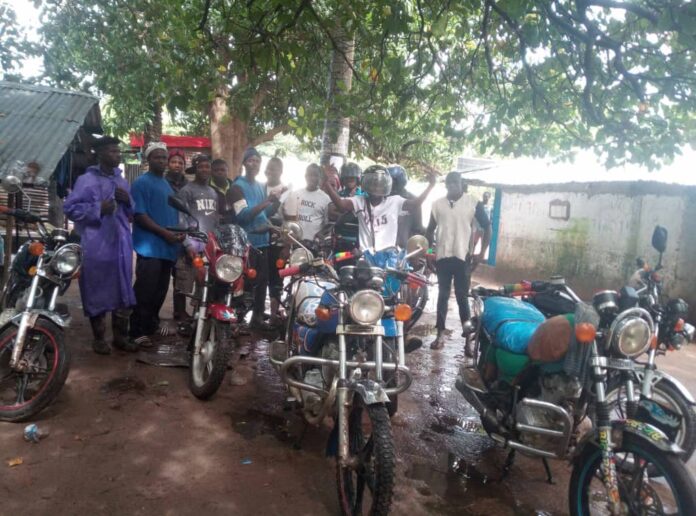By Michaella Faith Wright
Motorcycle riders in Kachumeh, who rely on it as a commercial means to transport passengers and support their families, have shared their struggles with The Fatu Network.
These challenges include the absence of proper roads for bikers in Kachumeh, escalating fuel prices, and a lack of recognition from authorities regarding their role as a means of commercial transportation, among other issues.
In an interview with Bubacarr Faye, a bike rider with over 11 years of experience, he shared some of the challenges he faces daily. “First of all, we don’t have good roads in Kachumeh, and sometimes we get into accidents with our passengers along the way,” he explained. “We don’t have many other options to survive and provide for our families, which is why we chose this profession.” Bubacarr concluded with a plea to the government and relevant ministries to do their job so that the community can have a safer environment for themselves and their children. “Sometimes we get injured because of the poor roads, but my only success is that I can bring food to the table and have something that keeps me busy. It’s better than doing nothing,” he added.
Musa Baldah, another bike rider who has been in the profession for over 11 years, shared his story as well. “When we started, it was like a family motorbike—taking our relatives to events like naming ceremonies or weddings because the area wasn’t safe for our loved ones. We used to hear about kidnappings, theft, and other crimes, so as youths, we decided to do something about it. That’s how we established bike riding in our community,” he said. Musa expressed that they wanted to set a precedent, ensuring the community would be a safe place not just for their families but also for visitors.
Musa reflected on the changes over the years, saying, “When we started, fuel was cheap, and we charged a minimal fare, but now everything in The Gambia is so expensive. Our biggest challenge is the poor road conditions, which are particularly difficult during the rainy season when the roads are flooded. We often have to take back roads, which strangers don’t like, and sometimes the heat is unbearable, leading to accidents. But we have no other choice but to continue for the sake of our families.”
Musa also highlighted the friction between riders and passengers regarding fare increases during the rainy season. “Passengers sometimes get angry and involve the police, who don’t understand our situation,” he noted. Despite the challenges, Musa emphasized that they have established rules among themselves to maintain respect and unity. “We also work as a team for the sake of peace and to live as one,” he said, adding that while he doesn’t benefit much financially, he will continue riding because it’s the only means of livelihood he has known for over 11 years.
Abdoulie Mballow, who has been a bike rider for over 9 years, echoed similar sentiments, stating, “We have been through a lot in terms of challenges and suffering, but we won’t give up because this is what brings food to our tables. I’m pleading with the government to legalize bike riding in the country; this will help us, and I know there are many young people without jobs who want to join this field, but the challenges deter them. The government needs to act urgently.” He also mentioned that many riders support their families in the villages, and they often take on passengers that cars refuse, like women with fish, to ease the burdens on the women in their community.
Salieu Kangteh, the president and leader of the bike riders, shared in an interview, “We have been suffering for years, and we need to feel like others as well. I am sending a message to the government to legalize bike riding for us in The Gambia so we can have a safe and enjoyable environment. Some of us have families to care for, and it’s not easy. We don’t want to have to bribe police officers every time we’re stopped. It’s time for change.”
The bikers in Kachumeh continue to work hard despite the obstacles they face, hoping for a future where their profession is recognized and supported by the government, ensuring a safer and more prosperous life for themselves and their communities.




